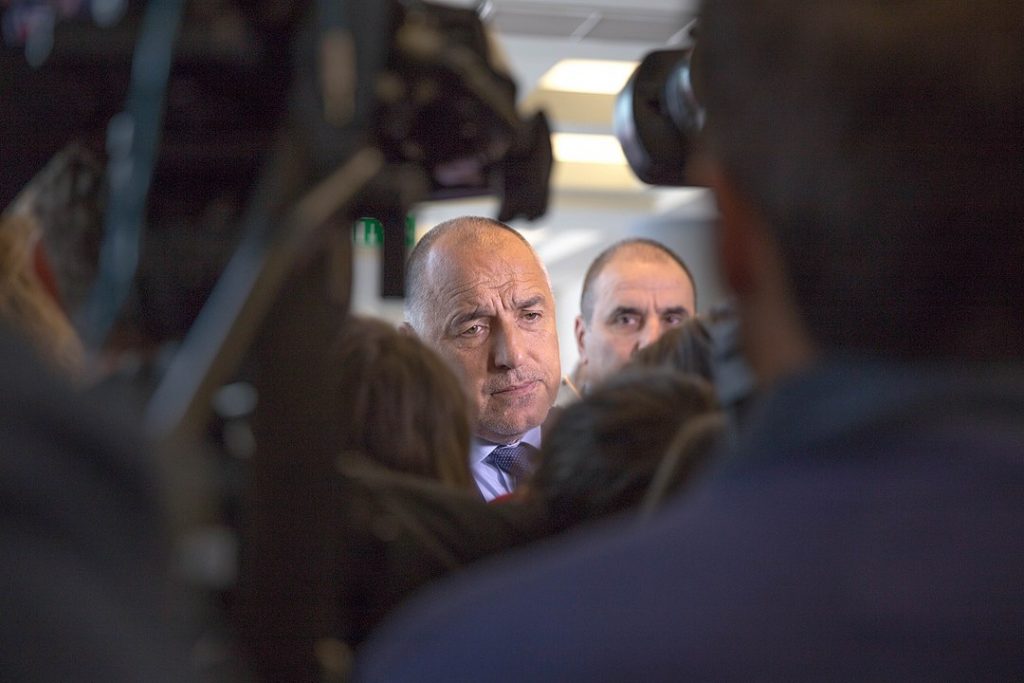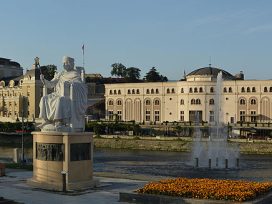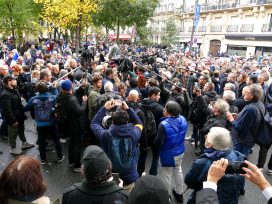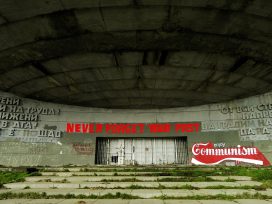A common opinion among journalists, academics and experts across the political spectrum is that the hegemony of the liberal order has become increasingly insecure. However, definitions of the ‘liberal order’ vary greatly. In some cases, the term refers to globalized financial markets; in others, to individualism and its ‘excesses’; and in others still, to the rule of law based on individual rights and the separation of powers. Various developments have recently challenged these ‘liberal orders’: the global financial crisis of 2007–2008, the migrant crisis of 2015/16, the decades-long policy of public spending cuts, also known as austerity, and increasing social discontent against the new inequalities.
What is called ‘disinformation’ merges different levels of economic, social and political reality into a conspiratorial view of the world. It replaces deliberative formation of collective identity and norms of social co-existence by collective myths. It cultivates expectations, perceptions and feelings about one’s place in society and turns critique – based on rational discourse and a commitment towards political transformation – into fatalism.
However, the term ‘disinformation’ misses a crucial fact: that media messages act upon us affectively and have done their job long before it occurs to us to check the reliability of information. The term allows media content to be regulated without the need for censorship – undoubtedly a practical advantage. But if we want to understand what is happening in the media today, and what is happening to us as media users, it is much more helpful to talk of ‘propaganda’.
This is not to narrow the focus on Russia, of course. The clichés of Kremlin propaganda are used widely, but they are also used by a wide variety of different actors, for purposes that may have nothing to do with Kremlin interests. In order to properly understand propaganda, we need to look beyond its content to the environment in which it thrives. One place to start is the precarious livelihood of the journalist who is involved in the production of propaganda without being a propagandist.
Propaganda without propagandists
Propaganda and propagandists are two different things. Propagandists do not necessarily believe their own propaganda. They might be obliged to say one thing today and the exact opposite tomorrow, and so don’t believe their own words much. But what about people who must say one thing today and the exact opposite tomorrow, but who are not propagandists. In other words, what about journalists?
Propagandists, the technologists of words and moods with which they do not identify, are the originators of propaganda. But they are not crucial to its success. If propaganda was always strategically circulated, there would be no efficient propaganda. Propaganda works when its clichés become part of everyday language. Propaganda stereotypes need be wrapped up in existing biases; existing anxieties and discontents need to be channelled towards objects (‘migrants’, ‘Europe’).
These anxieties and discontents need to be experienced as heteronomous; they are not to be discussed but externalized, in the form of catchwords and slogans couched in the essentialist language supplied by the propagandist. Crucial to every kind of propaganda is social fragmentation, social solitude. Populist propaganda not only takes advantage of social fragmentation, but also aims to intensify it, to channel it towards a particular type of governmentality.
Journalists who participate in the production of propaganda without being propagandists are like you and me: ordinary people who go to work to earn a living for their families. They once sought professional status but now no longer believe that what they are doing is a profession. They have ceased to belong to an elite and have become lonely fatalists.
We asked them what the Bulgarian media look like today, what their work involves and how they feel about it. They have many scandalous stories to relate about media corruption: how memory sticks with ready-written texts (‘black PR’ or paid content) are delivered to the editors, how journalists are ordered to run smear campaigns, and so on. But more telling still are their accounts of the solitude, uncertainty and insecurity that they experience in their jobs, where the only professional solidarity that exists is the solidarity of collective humiliation.
Although the Bulgarian media is a unique case in many respects, the processes it reveals are also a particularly distinct – perhaps grotesque – expression of changes in the wider democratic environment. These changes are structural and they are the precondition, not the consequence, of contemporary propaganda. They include the growing dependence of the media on corporate business, tabloidization and the reluctance of democratic societies to support the occupation known as ‘journalism’.

Photo via European People’s Party from Wikimedia Commons
Commercialization and vested interest
Analysis of media and interviews with journalists show the disintegration of media plurality in Bulgaria. What are the reasons for this? The market is changing under pressure from free online media, from the reorientation of television towards new formats (primarily entertainment), and from the fragmentation of audiences. This has different effects on journalism, whether print media or television and social media. But all cases have something in common: the emphasis on ‘attention-grabbing’ journalism – fast, sensational stories whose circulation is more important than credibility and public education. Evaluating television by ratings, not by trust, intensifies this process. Profiling and targeting media consumers have become paramount to advertisers, on whom the existence of media outlets directly depends.
The redirection of advertising to television and social media has dealt a blow to print media. As one journalist told us, ‘the new masters of media content are not the editor-in-chief, but the advertising department or the boss to whom it’s very important that something concerning this friend of his be published’. If TV journalism is becoming ever more indistinguishable from entertainment, in the print media it serves for direct interference in the political game (‘so then it became obvious, relentlessly clear who’s giving the money, but since you have no other choice, you must grit your teeth and comply’). If you don’t want to be part of this game, you must retire to deeper waters and stick to safer topics. If this turns out to be impossible, you do your best to move to another media outlet (‘when you actually get kicked out, you can find a job in another newspaper, but the situation there will be more or less the same’). Radio journalists don’t even have this option, because most radio stations have turned to pure entertainment. How to cope? Cynicism hides people’s effort to retain personal and professional dignity; to deal with the alienation that their work induces.
Journalists without any journalistic experience before 1989 see this as an international phenomenon. However, in Bulgaria the loss of distance between tabloidized entertainment and day-to-day politics is particularly manifest. Media are used as political instruments not in an indirect way, but for disseminating political messages. One journalist put it like this: ‘What truly kills pluralism is being sure that every opinion – to say nothing of facts – isn’t freely expressed but simply the product of some [vested] interest.’ And in more mundane terms: ‘there’s no barrier between power and media. They are on first-name terms, they drink their whisky together.’ The media’s failure to self-regulate is not solely responsible for this, of course. Public institutions are much too tolerant of their own systemic problems, which do not get resolved until they make the headlines. This suggests to the media that they can do politics.
Another distinctive feature of the Bulgarian media is the lack of clarity about whose interests are at play. ‘I never ask who the owner of a newspaper is’, said one interviewee. ‘I know that, even if they tell me who, it most probably won’t be him. So there’s no point in asking.’ In the search for ways to keep newspapers afloat – the cover prices of Bulgarian newspapers usually cover printing costs only – all sorts of shady interests enter the equation, usually as entirely legitimate contracts between companies. By and large, these ‘interests’ read in the newspapers what they themselves have ordered.
De-professionalization
Every journalist we talked to attested to a decline in professionalism, which they explained above all with lack of demand. As one put it, TV journalists have been reduced to ‘microphone holders’. ‘No one needs people with a long memory,’ he commented. ‘We all too readily forget everything that’s written in news-writing manuals and in codes of ethics.’ In sociological terms, the Bulgarian media has disintegrated as a field of communication and conflict; despite their shrill tone, they do not engage in open confrontation. Journalism’s specific capital is also disappearing: its ability, as a profession that is at least partly autonomous, to empower the public to make informed decisions on the issues of the day. Again and again, we it heard said that expressing one’s opinions freely jeopardizes one’s career.
‘De-professionalization’ need not be negative per se. ‘Professionalism’ implies the guarding of boundaries: professional bodies control access to professions. ‘De-professionalization’ means less the decline of skills than the elimination of control over eligibility. In Bulgaria, however, there is no collectively recognized regulatory body responsible for licensing journalists; anyone can work in the profession. This has enabled journalism’s total subservience to the market. One experienced journalist described the liberalization of journalism in Bulgaria as the rapid transition from a system of centralized state censorship, in which access to the profession was extremely difficult, to a system of commercial-political censorship, in which access to the profession is extremely easy. As a result, journalists become replaceable.
In the absence of an official body, it is up to the journalistic community to self-regulate. But the community lacks the mechanisms and resources necessary to do so. The only regulation that takes place is done by the media outlets themselves – which is to say the employers and owners, who are often unknown to the journalists working for them, not to mention the public at large. One journalist described the situation thus: ‘Anyone could do anything to us – fire us, pay us off-the-books salaries – or a small salary in return for paying our social security contributions, [we’ve seen] all this over the years. And anyone can order [stories].’
Compromise
The general feeling is that there is no media autonomy in Bulgaria. All that remains is the autonomy of the individual journalist, which is frequently articulated as ‘internal exile’. ‘if you’re told something you’ve written cannot be published,’ said one journalist, ‘you quit and look for a job at another newspaper’. This might be called the ‘normalization of cynicism’. However we should not forget that people are not simply looking after their families, paying mortgages, and so on; they are also looking for recognition in a sphere that has atrophied to the point of disappearance. The only way to obtain recognition and get heard is to say something outspoken. Parrhesia becomes self-promotion. Celebrity journalists have no qualms about mixing journalism, entertainment and direct politics.
For the rest of the guild, self-censorship is a personal strategy for coping with competition among colleagues for jobs and extra-pay. This is a purely corporate model – a model of exploitation where you can earn fifty percent on top of your salary if you become a producer or develop a new rubric. In principle, there’s nothing wrong this. But in practice it means longer hours, downsizing staff, ending subject specialization and, ultimately, reducing journalism to the piecing together of information available online. This paves the way for propaganda, disinformation, bullshit – call it what you will. Your world has shrunk to your office and you feel that every job is your last. As the number of journalists and editorial staff at media outlets shrinks, finding a position at another media outlet is a matter of pure luck.
As ownership structures become increasingly opaque, rumours about over-concentration proliferate. The sense of sharing a common fate encourages solidarity with fellow journalists from ‘enemy’ media outlets. Everyone knows the ethical compromises that the other is making – this has become the backbone of the journalistic ethic. Such compromises are directly at variance with standards of independence and professionalism (including those contained in the two existing codes of journalistic ethics in Bulgaria). However, from the human perspective, they are the expression of solidarity. Personal morality has become an excuse for public amorality; moral poverty becomes a form of stoicism.
This is neither purposive nor painless conformism. The overwhelming majority of journalists in Bulgaria have joined the precariat: the social security contributions paid by your employer are based on a minimal salary, while your real salary is paid off the books. And you are constantly afraid that even that may be taken away from you. You are compelled to be loyal to your corporation even if you loathe it, despite you loathing yourself for it. There is simply no other structure of solidarity. This explains the very high threshold of tolerance for the systemic problems of the media as institutions.
The circulation of ‘disinformation’ is an effect, not a cause of democratic deficit in our societies, both in eastern Europe and elsewhere. However, it is also a signal of this deficit. It can only be overcome by addressing structural problems, not by regulating media content. So let’s keep calling it propaganda.








